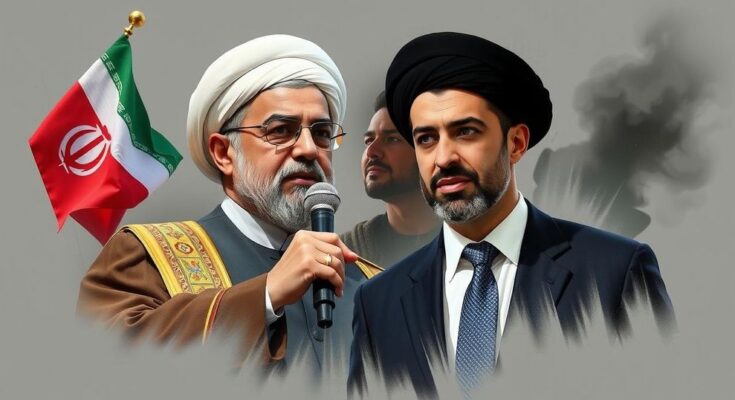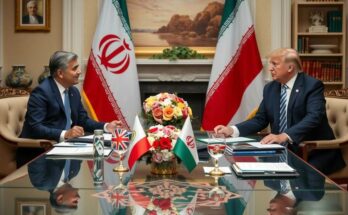Iran’s Supreme Leader, Ayatollah Ali Khamenei, has accused the US and Israel of plotting the ousting of Bashar al-Assad, linking a neighboring country to the events as well. He claims Iranian intel warned Syria of threats and dismisses any notion of weakened Iranian power following the regime change, insisting that resistance against Western influence will only strengthen.
In a recent speech addressing the political upheaval in Syria, Iran’s Supreme Leader Ayatollah Ali Khamenei accused the United States and Israel of orchestrating the ousting of Bashar al-Assad, illustrating this as part of a coordinated plot against his regime. Khamenei emphasized the role of a neighboring country, hinting at its involvement without specifying which nation, although Turkey, among others, has been known to support opposition forces against al-Assad.
To reinforce his points, Khamenei stated that Iranian intelligence had cautioned Syria about potential threats to its governance, which he claimed had been disregarded. He further asserted that despite the fall of al-Assad, Iran’s influence and the so-called “axis of resistance” against Western powers remained intact. Khamenei proclaimed that the notion of Iran being weakened was misguided, stating, “The more pressure you apply, the stronger it becomes; the more crimes you commit, the more motivated it becomes.”
The context surrounding this speech involves a backdrop of significant military and political support provided by Iran and Russia to the al-Assad regime since the onset of the Syrian conflict. The fall of al-Assad marks a pivotal shift in a longstanding alliance which has been a cornerstone of Iran’s regional strategy against U.S. and Israeli interests. Khamenei’s remarks reflect a steadfast commitment to maintaining Iranian influence amidst changing political landscapes in Syria.
Following al-Assad’s departure, Khamenei indicated that relations between Iran and Syria would persist, asserting that both countries would continue to cooperate in fostering a future government that incorporates diverse segments of the Syrian populace. This stability in partnership underscores Iran’s strategic interests despite the current upheaval in Syrian governance and regional pressures.
The article examines the ongoing political turmoil in Syria following the ousting of Bashar al-Assad’s regime, focusing on the perspective of Iran’s Supreme Leader, Ayatollah Ali Khamenei. Since the beginning of the Syrian Civil War in 2011, Iran has provided substantial support to al-Assad, resulting in a close alliance characterized by shared interests in countering U.S. and Israeli influence in the region. This alliance has been increasingly challenged by shifts in the geopolitical climate, prompting Khamenei’s recent assertions regarding the implications of al-Assad’s removal and Iran’s capacity to maintain its influence despite these adversities.
In conclusion, Ayatollah Ali Khamenei’s comments reveal Iran’s determination to navigate the complexities following the fall of Bashar al-Assad. By attributing the events to foreign plots and asserting the resilience of the axis of resistance, Khamenei aims to project strength amidst significant political changes. The continued cooperation with Syria remains a focal point for Iran, indicating that despite regional challenges, it intends to uphold its strategic interests as it seeks to adapt to the evolving landscape.
Original Source: www.aljazeera.com




